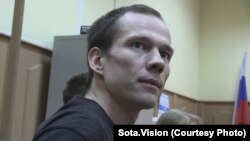Ildar Dadin is the first person convicted under a Russian law criminalizing participation in more than one unsanctioned protest. He is serving a 2 ½ year sentence at a penal colony in northwestern Russia.
In early November he was able to smuggle a letter to his wife, Anastasiya Zotova, from Labor Colony No. 7 (IK-7) in Karelia, in which he recounted how he had been thrown in a punishment cell after arrival at the colony for protesting against the planting of razor blades among his belongings, and for the lack of basic necessities like soap and toilet paper. When he declared a hunger strike, Dadin alleged guards retaliated by beating him multiple times, thrusting his head in a toilet, stripping him naked, dangling him by handcuffs, and threatening him with rape. Dadin urged his wife to spread the word of his ordeal as widely as possible, hoping increased publicity would help keep him alive.
Valeriya Masimenko, Deputy Director of Federal Corrections Service, said on November 28 that a medical investigator who had examined Dadin found no signs of torture, a claim seconded by Tatyana Moskalkova, Russia’s human rights ombudsman, who said she had received pictures of Dadin indicating he was not harmed.
But Igor Kalyapin and Pavel Chikov, human rights lawyers and members of the Presidential Human Rights Council reported that they had visited Dadin on November 7 and found welts on his wrists, with the angle of the cuts in his skin consistent with his account of being suspended by handcuffs.
They also found other inmates at IK-7 who testified that Dadin was beaten and that others had suffered similar mistreatment. The two human rights lawyers told prison authorities that they could supply the names of these prisoners if requested.
The independent news site Meduza also published accounts of IK-7 prisoners about torture.
Days after the visit by the human rights lawyers, Dadin refused on November 12 to submit to a physical exam by a visiting doctor unless his lawyer could be present, a request which was refused that same day.
On December 1, prison investigators declared that the use of force and handcuffs on Dadin were "lawful," since he had refused to obey commands of the administration.
After first being placed in solitary confinement, Dadin has since been transferred to another labor colony.
Amnesty International, which has declared Dadin a prisoner of conscience, has urged Russian authorities to release him immediately as well as "end the pattern of impunity for torture."
The Council of Europe has also expressed its concerns about Dadin with Russian officials.
